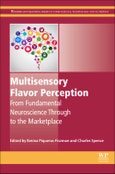Multisensory Flavor Perception: From Fundamental Neuroscience Through to the Marketplace provides state-of-the-art coverage of the latest insights from the rapidly-expanding world of multisensory flavor research. The book highlights the various types of crossmodal interactions, such as sound and taste, and vision and taste, showing their impact on sensory and hedonic perception, along with their consumption in the context of food and drink.
The chapters in this edited volume review the existing literature, also explaining the underlying neural and psychological mechanisms which lead to crossmodal perception of flavor. The book brings together research which has not been presented before, making it the first book in the market to cover the literature of multisensory flavor perception by incorporating the latest in psychophysics and neuroscience.
Please Note: This is an On Demand product, delivery may take up to 11 working days after payment has been received.
Table of Contents
1. Introduction to multisensory flavor perception
Part I: Crossmodal effects on flavor perception 2. Taste-aroma-trigeminal-texture interactions 3. Attention and flavor binding 4. Synthetic nature of flavor 5. Oral referral 6. Oral-somatosensory texture 7. Color and flavor perception 8. Sound and flavor perception 9. Liking and the effect on flavor perception
Part II: Neuroscience of flavor perception 10. Flavor memory 11. Individual differences in multisensory flavor perception 12. Neuroscience of flavor 13. Neuroscience of reward/hedonics 14. Taste genetics on flavor perception 15. Relationship between flavor and internal sensations
Part III: Practical uses of multisensory flavor perception 16. Plateware, cutlery, and glassware 17. Branding flavor: Blind vs. sighted tasting 18. Marketing of multisensory flavor products








